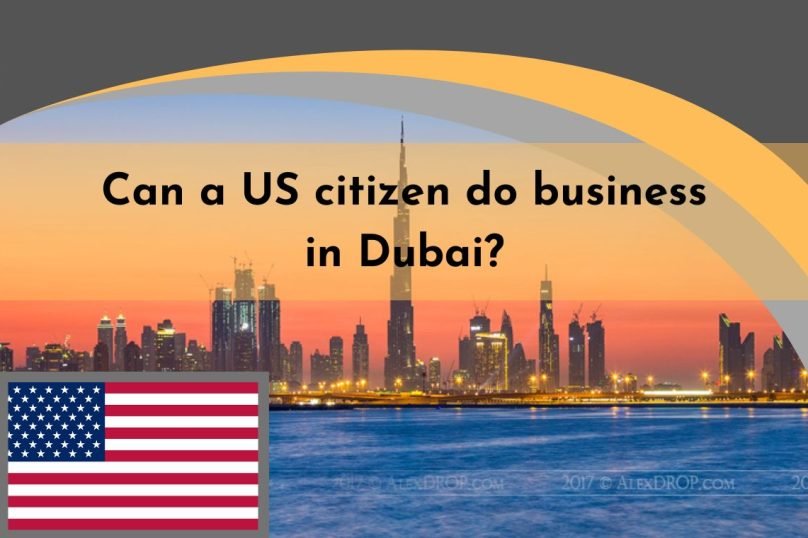Can a US citizen do business in Dubai?

In our globalized world, opportunities for business ventures transcend national borders. For US citizens, the prospect of doing business in Dubai, a thriving international business hub, is both tantalizing and complex.
In an increasingly interconnected global economy, the question of whether US citizens can successfully engage in business ventures abroad is both relevant and crucial.
Can a US citizen do business in Dubai?
Purpose of the Guide
This guide is dedicated to unraveling the intricacies of this endeavor, shedding light on the opportunities and challenges faced by US citizens seeking to engage in business activities in Dubai, one of the most dynamic and rapidly growing business hubs in the Middle East.
The primary purpose of this guide can be summed up as follows:
- Inform and Empower: It serves as an informative resource designed to empower US citizens with the knowledge necessary to navigate the multifaceted landscape of doing business in Dubai. Understanding the legal, financial, and cultural aspects of this venture is vital for making informed decisions.
- Minimize Risks: By shedding light on the potential hurdles and pitfalls, this guide aims to help US entrepreneurs and investors mitigate risks. Informed decisions are key to reducing uncertainties associated with international business ventures.
- Comprehensive Guidance: Dubai offers a fertile ground for business opportunities, but it also presents unique challenges. This guide offers a comprehensive perspective, encompassing legal requirements, market analysis, cultural considerations, and more, to aid US citizens in successfully treading the Dubai business landscape.
- Enable Effective Decision-Making: Armed with knowledge, US citizens can make strategic decisions aligned with their goals, whether it’s starting a new venture, expanding an existing one, or making investments in Dubai.
- Is Business In Dubai Profitable? (6 Profitable Sectors In Dubai)
- Trade License In Sharjah: Comprehensive Guide
- Business License In Dubai – 3 Penalties, Renewal & Challenges
- How Much Money Is Required To Start A Small Business In The UAE?
- How Much Money Do You Require Minimum To Start A Business In Dubai?
What to Expect
To fulfill its purpose, this guide is structured into several chapters, each dedicated to a specific aspect of US citizens engaging in business in Dubai:
- Business Landscape in Dubai: An exploration of Dubai’s business environment, including its appeal, economic stability, opportunities, and challenges.
- Legal Framework: Detailed insights into the legal requirements and business structures available to US citizens in Dubai, ensuring compliance with local laws.
- Business Setup Process: A step-by-step guide through the practical process of establishing a business in Dubai, covering licensing, registration, and visa requirements.
- Taxation and Financial Considerations: An examination of taxation, financial planning, and banking options for US citizens conducting business in Dubai.
- Market Analysis: Understanding Dubai’s market and cultural dynamics, with insights into consumer behavior, market trends, and entry strategies.
- Cultural and Business Etiquette: A guide to navigating the cultural nuances of business in Dubai, facilitating effective communication and relationship-building.
- Case Studies: Real-life success stories and challenges faced by US citizens doing business in Dubai, offering practical insights.
- Legal and Compliance Considerations: Addresses intellectual property, contractual agreements, and employment laws to ensure legal compliance.
- Marketing and Business Development: Strategies for marketing, networking, and partnerships in Dubai’s competitive business landscape.
- Financial Management and Compliance: Delves into financial reporting, compliance, and accessing financial services in Dubai.
- Conclusion: A summary of key takeaways and insights into the future of US businesses in Dubai.
By following this structured guide, US citizens can acquire a holistic understanding of the opportunities and challenges that await them in Dubai’s vibrant business ecosystem.
Business Landscape in Dubai
Overview of Dubai’s Business Environment
Dubai’s business environment is a magnet for entrepreneurs and investors from around the world. Understanding the factors that contribute to its appeal is crucial for US citizens contemplating business ventures in this dynamic city. This section provides an in-depth look at the key aspects that make Dubai an attractive destination for businesses:
- Strategic Location: Dubai’s strategic location at the crossroads of Europe, Asia, and Africa makes it a natural trading and logistics hub. Its world-class infrastructure, including the Jebel Ali Port, Al Maktoum International Airport, and extensive road networks, facilitates the movement of goods and people.
- Economic Stability: Dubai boasts a robust and diversified economy, which has weathered global economic downturns with resilience. Its stability is underpinned by prudent fiscal policies and a proactive government that encourages business growth.
- Tax Benefits: Dubai offers a favorable tax regime with no personal income tax, corporate tax, or customs duties for most goods. The introduction of the Value Added Tax (VAT) in 2018 is a notable exception.
- Free Zones: The city’s numerous free zones provide businesses with 100% foreign ownership, exemption from import and export duties, and simplified customs procedures, making them highly attractive for international businesses.
- Skilled Workforce: Dubai has a diverse and skilled workforce drawn from around the globe. Its cosmopolitan nature fosters a culture of innovation and adaptability.
Opportunities and Challenges
While Dubai presents a plethora of opportunities, it also poses unique challenges that US citizens should consider before venturing into the market:
- Market Diversity: Dubai’s diverse population, consisting of both expatriates and locals, creates a rich and varied consumer base. However, understanding and targeting these diverse segments can be challenging.
- Competition: Dubai’s attractiveness has led to stiff competition in various sectors. Navigating this competitive landscape requires a well-thought-out market entry strategy.
- Cultural Sensitivity: Dubai is rooted in Islamic culture, and understanding and respecting local customs and traditions is paramount. Cultural sensitivity is essential for building trust and successful business relationships.
- Legal Framework: The legal and regulatory environment is generally business-friendly, but it is essential to be aware of local laws, including those related to business ownership, intellectual property, and labor.
- Market Volatility: Dubai’s economy is susceptible to global economic trends, and market conditions can be subject to fluctuations, affecting business performance.
By comprehensively examining these factors, US citizens can better evaluate the feasibility and potential of their business ventures in Dubai and plan accordingly.
Legal Framework
Legal Requirements for Foreign Businesses
Dubai’s legal framework for foreign businesses is designed to encourage international investment while ensuring transparency and accountability. US citizens looking to establish businesses in Dubai need to be familiar with the following legal aspects:
- Commercial Companies Law: Dubai’s Commercial Companies Law governs the formation and operation of businesses in the emirate. This law stipulates the requirements and procedures for setting up various types of companies, including limited liability companies (LLCs), partnerships, and branches of foreign companies.
- Foreign Ownership Restrictions: Historically, foreign ownership was restricted in most sectors, with a requirement for a local sponsor or partner holding at least 51% of the company. However, recent changes have allowed for full foreign ownership in certain sectors, primarily within free zones. US citizens should be aware of these sector-specific ownership regulations.
- Legal Advisors: Given the complexity of Dubai’s legal landscape, seeking legal counsel is highly advisable. Competent legal advisors can guide US citizens through the intricacies of business registration, compliance, and contracts.
Business Structures and Ownership
US citizens can choose from various business structures when establishing a presence in Dubai, each with distinct implications for ownership and liability:
- Limited Liability Company (LLC): An LLC is a common choice for foreign investors in Dubai. It allows shared ownership between US citizens and Emirati nationals or companies. The liability of individual members is limited to their share in the capital.
- Free Zone Company: Free zones offer 100% foreign ownership, making them an attractive option for US citizens. However, they come with restrictions on where the business can operate and whom it can serve. Popular free zones include Dubai Multi Commodities Centre (DMCC) and Dubai Internet City.
- Branch Office: US citizens can establish a branch office of their foreign company in Dubai. While this option allows full foreign ownership, it operates under the umbrella of the parent company, which remains responsible for its activities.
- Partnership: Partnerships with Emirati nationals are another possibility for US citizens. In such arrangements, both parties share ownership and responsibilities as outlined in the partnership agreement.
The choice of business structure should align with the nature of the business, market strategy, and ownership preferences. It’s essential for US citizens to thoroughly understand the implications of each structure in terms of ownership, liability, and regulatory compliance to make an informed decision when establishing their business in Dubai.
Business Setup Process
Business Setup Options
US citizens interested in doing business in Dubai have several setup options to consider. Each option has its advantages and limitations, depending on the nature of the business and the owner’s preferences. Here’s an overview of the primary pathways:
- Free Zones: Dubai offers numerous free zones catering to various industries, such as technology, media, logistics, and finance. Free zones provide 100% foreign ownership, tax incentives, and streamlined registration processes. Examples include Dubai Internet City, Dubai Media City, and Dubai Multi Commodities Centre (DMCC).
- Mainland Setup: Operating in the Dubai mainland allows businesses to access the local market and government contracts. However, foreign ownership restrictions may apply, typically requiring a local sponsor or service agent. Certain activities, like professional services, may allow 100% foreign ownership.
- Offshore Company: Dubai also offers offshore company formation through jurisdictions like Jebel Ali Offshore and Ras Al Khaimah (RAK) Offshore. These entities are primarily designed for international business and asset protection and cannot conduct business within the UAE.
When selecting a setup option, US citizens should consider factors such as business type, target market, ownership preferences, and the need for physical office space. Free zones are often favored for their flexibility, while mainland setups may be suitable for businesses focused on the local market.
Licensing and Registration
Setting up a business in Dubai involves a series of steps and documentation. US citizens should follow these general guidelines:
- Choose a Business Name: Select a unique and compliant business name following Dubai’s naming conventions.
- Determine the Legal Structure: Decide on the appropriate legal structure based on the chosen setup option (e.g., LLC, free zone company, branch office).
- Apply for Initial Approvals: Depending on the business type, apply for initial approvals from relevant authorities. This may include approvals from free zone authorities, the Department of Economic Development (DED), or other regulatory bodies.
- Prepare Required Documents: Compile the necessary documentation, which typically includes a business plan, passport copies, visa applications, and any specific documents required by the chosen setup option.
- Choose a Location: If operating in the mainland, secure a physical office space compliant with regulations. Free zone companies may have flexible office solutions within the respective zone.
- Obtain Licensing: Apply for the required business licenses based on your activities and location. Free zones often offer bundled licenses that cover multiple activities.
- Open a Corporate Bank Account: US citizens will need to open a corporate bank account in a UAE bank, which is a standard requirement for business operations.
Visa and Residency
To live and work in Dubai, US citizens will need appropriate visas and residency permits. The UAE offers various visa options, including:
- Investor Visa: Available to business owners, this visa is typically tied to the business’s ownership structure and capital investment.
- Employment Visa: If working for a UAE-based company, US citizens can obtain an employment visa sponsored by their employer.
- Freelancer Visa: Some free zones offer freelancer or entrepreneur visas, allowing individuals to operate as freelancers or small business owners.
- Dependent Visa: Family members of US citizens working in Dubai can apply for dependent visas to reside in the UAE.
Each type of visa has specific requirements and procedures, which may include health screenings and security clearances. US citizens should work with their business setup advisors to navigate the visa and residency process smoothly.
Taxation and Financial Considerations
Taxation in Dubai
Dubai’s tax regime is a critical consideration for US citizens doing business in the emirate. Here’s an overview of key tax-related aspects:
- No Personal Income Tax: One of Dubai’s most appealing features for entrepreneurs is the absence of personal income tax. US citizens can enjoy their earnings in Dubai without the burden of income tax.
- Corporate Tax: While there is no corporate income tax in many Dubai free zones, companies operating in the Dubai mainland may be subject to a corporate tax rate of 20%. It’s important to understand the tax implications based on your chosen business setup.
- Value Added Tax (VAT): Dubai introduced VAT in 2018, which currently stands at 5%. US citizens doing business in Dubai should be aware of VAT obligations, such as registration, filing returns, and compliance with VAT laws.
- Double Taxation Agreements (DTAs): The United States has a double taxation agreement with the UAE, which aims to prevent double taxation and fiscal evasion of income taxes. This agreement helps US citizens navigate the complexities of international taxation.
US citizens should consult with tax experts and accountants who specialize in international taxation to ensure they comply with both US and UAE tax regulations. Proper tax planning can optimize financial outcomes and prevent legal issues.
Financial Planning
Financial planning is crucial for US citizens establishing businesses in Dubai. Here are key financial considerations:
- Banking: Choosing the right bank is essential. Dubai has a robust banking sector with numerous international and local banks. US citizens should consider factors such as fees, services, and international banking capabilities when selecting a bank.
- Currency Exchange: Dubai’s official currency is the UAE Dirham (AED). US citizens should monitor exchange rates, especially if they have income or expenses in different currencies. Currency exchange services are widely available in the city.
- Financial Regulations: Dubai has strict financial regulations and anti-money laundering (AML) measures. Ensure compliance with these regulations to avoid legal issues. It’s advisable to consult with financial advisors or legal experts who specialize in Dubai’s financial laws.
- Investment and Asset Management: US citizens may also consider investment opportunities in Dubai. The emirate has a growing financial market, including stock exchanges and real estate investment options.
- Retirement Planning: Consider retirement planning and pension schemes, both in the US and the UAE, to secure your financial future.
Sound financial planning, including tax management and compliance with financial regulations, is essential for the success and sustainability of a business venture in Dubai for US citizens.
Business Sector and Market Analysis
Identifying Suitable Business Sectors
Selecting the right business sector is a pivotal decision for US citizens looking to establish themselves in Dubai. Here’s a comprehensive look at this aspect:
- Economic Diversification: Dubai’s economy is diverse, with key sectors including tourism, real estate, logistics, finance, and technology. US citizens should assess which sectors align with their expertise and business goals.
- Market Demand: Consider the current and projected market demand for products or services in your chosen sector. Dubai’s rapidly growing population and its status as a regional business hub create numerous opportunities.
- Competition: Analyze the competitive landscape in your chosen sector. Understanding existing competitors and their market share is crucial for devising a successful market entry strategy.
- Government Initiatives: Dubai offers incentives and support for specific sectors. Research government initiatives, grants, and incentives that can facilitate your entry into targeted sectors.
- Growth Potential: Evaluate the growth potential of the sector. Some sectors, like technology and renewable energy, are experiencing rapid expansion, presenting promising opportunities for US entrepreneurs.
Market Research and Entry Strategies
Conducting thorough market research is the foundation of a successful business venture in Dubai. Here’s how US citizens can approach this:
- Market Assessment: Begin with a comprehensive assessment of the Dubai market. Analyze demographic trends, consumer behavior, and cultural nuances that can impact your business.
- Competitive Analysis: Understand your competitors, their strengths, weaknesses, and market positioning. Identify gaps in the market that your business can fill.
- Regulatory Compliance: Familiarize yourself with Dubai’s regulatory framework for your specific industry. Ensure that your business plans align with local regulations and licensing requirements.
- Market Entry Strategies: Depending on your sector and market research, formulate a market entry strategy. Options include setting up in a free zone, partnering with local businesses, or establishing a mainland business.
- Cultural Sensitivity: Dubai’s diverse population includes both locals and expatriates. Tailor your marketing and business practices to be culturally sensitive and inclusive.
- Localization: Consider localizing your products or services to meet the preferences and needs of the Dubai market.
Market research and entry strategies should be dynamic processes, continually adapted to evolving market conditions. Collaborating with local experts and industry professionals can provide invaluable insights into Dubai’s unique business landscape.
Cultural and Business Etiquette
Understanding Dubai’s Culture
Understanding and respecting the local culture is essential for successful business interactions in Dubai. Here’s an overview:
- Cultural Diversity: Dubai is a multicultural city with residents from around the world. While Emirati culture is predominant, you’ll encounter people from diverse backgrounds, including Arabs, South Asians, Europeans, and Americans.
- Islamic Values: Islam is the dominant religion in Dubai, and Islamic values influence daily life. Respect for Islamic customs, such as modest clothing and observing Ramadan, is crucial.
- Greeting Customs: The traditional Arabic greeting is a warm handshake and the phrase “As-Salamu Alaykum” (peace be upon you). Respond with “Wa Alaykum As-Salam” (and peace be upon you).
- Dress Code: Dubai is relatively liberal when it comes to clothing, but modesty is encouraged. Business attire is typically formal, with suits for men and conservative dresses or suits for women.
- Hospitality: Hospitality is highly valued in Emirati culture. Accept invitations for coffee, meals, or gatherings as it’s an excellent way to build relationships.
Business Etiquette
Navigating business interactions in Dubai requires an understanding of local customs and etiquette:
- Punctuality: While meetings often start slightly late, it’s essential to be punctual. Arriving on time shows respect for your counterparts.
- Business Cards: Exchanging business cards is customary. Include your qualifications and any academic titles on your card.
- Language: Arabic is the official language, but English is widely spoken in the business world. You can conduct most business transactions in English.
- Negotiation Style: Business negotiations in Dubai are often slow and relationship-focused. Be patient and invest time in building rapport with your partners.
- Gift-Giving: Giving gifts is a common practice, especially during festive occasions. Gifts should be thoughtful and not too extravagant.
- Ramadan: During Ramadan, the holy month of fasting, business hours may change. Be mindful of the reduced working hours and the significance of the holiday.
- Dining Etiquette: Business meetings often involve meals. Wait for the host to begin eating, and use your right hand for eating and greeting.
Building strong business relationships in Dubai is based on trust, respect, and cultural sensitivity. Taking the time to understand and adapt to local customs can greatly enhance your business endeavors in the city.
Case Studies
Success Stories
Learning from the experiences of successful US citizens who have established businesses in Dubai can provide valuable insights into the possibilities and strategies for success. Here are some real-life success stories:
- Tech Startup Triumph: John, a US entrepreneur, founded a technology startup in Dubai’s Silicon Oasis Free Zone. By leveraging the city’s tech-friendly infrastructure and a focus on innovation, his company rapidly expanded. John’s success demonstrates how Dubai’s supportive ecosystem can propel tech startups.
- Culinary Entrepreneurship: Sarah, an American chef, opened a restaurant in Dubai’s bustling food scene. By blending her American culinary expertise with local flavors, she created a unique dining experience. Sarah’s story illustrates how cultural fusion can lead to success in Dubai’s diverse market.
- Consulting Excellence: Michael, a US management consultant, established a consulting firm targeting the UAE’s growing financial sector. His firm provided specialized services and advice tailored to the local market’s needs. Michael’s journey showcases the opportunities in providing niche services.
Challenges and Lessons Learned
Starting a business in a new country often comes with challenges. Here are some case studies highlighting challenges faced by US entrepreneurs in Dubai:
- Navigating Bureaucracy: Emily encountered bureaucratic hurdles during her company’s registration process. She learned the importance of seeking professional assistance to streamline the setup process.
- Cultural Missteps: David, a US marketing expert, initially struggled to connect with local clients due to cultural misunderstandings. He recognized the significance of cultural sensitivity and adapted his approach.
- Market Timing: Jessica started a retail business but faced difficulties during the economic downturn. She learned the importance of thorough market research and the necessity of adapting to changing economic conditions.
These case studies offer practical insights into the challenges and triumphs of US citizens doing business in Dubai. They provide valuable lessons on adapting to a new business environment, building relationships, and making strategic decisions.
Legal and Compliance Considerations
Intellectual Property and Contractual Agreements
In the realm of business, safeguarding intellectual property and ensuring the integrity of contractual agreements are paramount. This chapter explores the legal and compliance aspects in Dubai:
- Intellectual Property Protection: Dubai has robust intellectual property laws, but understanding how to navigate them is crucial for US entrepreneurs. This section delves into the importance of patent, copyright, and trademark protection, as well as strategies for safeguarding intellectual assets.
- Contractual Agreements: Drafting and enforcing contracts correctly is vital. Whether it’s supplier agreements, employment contracts, or partnership agreements, this section provides insights into how to create legally sound contracts that protect your interests.
Employment and Labor Laws
When hiring employees in Dubai, it’s essential to understand the labor laws and regulations that govern employment relationships. This section covers:
- Labor Law Framework: Dubai’s labor laws provide clear guidelines for employee rights, including working hours, wages, and safety standards. US citizens employing workers in Dubai must adhere to these regulations.
- Employee Rights and Obligations: Understanding the rights and obligations of both employers and employees is crucial for maintaining a harmonious work environment. This section outlines key aspects of labor laws that US entrepreneurs need to be aware of when building a workforce in Dubai.
Compliance with legal and regulatory requirements is fundamental to the success of any business venture in Dubai. This chapter equips US citizens with the knowledge and guidance needed to navigate the legal landscape effectively while conducting business in Dubai.
Marketing and Business Development
Marketing Strategies
Marketing is a pivotal aspect of business success in Dubai. This chapter provides insights into tailoring effective marketing strategies for businesses:
- Market Analysis: Before devising marketing strategies, it’s crucial to understand the local market thoroughly. This section discusses market research and analysis, including consumer behavior, market trends, and competitor insights.
- Digital Marketing: In the digital age, an online presence is essential. Discover how to leverage digital marketing channels such as social media, SEO, and online advertising to reach your target audience effectively.
- Local Marketing Approaches: Dubai has a unique market with its own cultural nuances. Learn how to adapt your marketing strategies to resonate with local consumers while respecting cultural sensitivities.
Networking and Partnerships
Networking and forming strategic partnerships are essential for business growth in Dubai:
- Building a Network: Dubai is a hub for international business, making networking opportunities abundant. This section provides tips on building a professional network, attending industry events, and joining business associations.
- Collaborative Growth: Dubai offers numerous opportunities for collaboration and partnership. Discover how partnering with local businesses, suppliers, or distributors can contribute to your business’s growth.
This chapter equips US citizens with the knowledge and strategies needed to market their businesses effectively in Dubai’s competitive environment. It also highlights the significance of networking and partnerships in expanding business opportunities.
- Is It Cheap To Start A Business In Dubai?
- How Much Do Business Owners Make In Dubai?
- How Much Is Business Visa In Dubai?
- Benefits Of Opening A Company In Dubai
- How Long Does It Take To Setup A Company In Dubai?
- How much does it cost to set up a free zone company in Dubai?
Financial Management and Compliance
Financial Reporting and Compliance
This chapter delves into the crucial financial aspects of running a business in Dubai:
- Financial Reporting Requirements: Understand the financial reporting standards and regulations that apply to businesses in Dubai. Learn how to prepare financial statements and reports that comply with local requirements.
- Taxation and Compliance: Dubai’s tax laws can be complex. Discover the nuances of taxation for businesses, including Value Added Tax (VAT), corporate taxes, and customs duties. Ensure your business stays compliant and avoids financial penalties.
Banking and Financial Services
Effective financial management is key to business success. This section covers essential financial services:
- Banking Services: Explore the banking landscape in Dubai, including opening business accounts, managing transactions, and accessing financial products and services.
- Currency Exchange and International Transactions: As an international business hub, Dubai deals with multiple currencies. Learn about currency exchange services and strategies for managing international transactions.
This chapter empowers US citizens with the knowledge needed to navigate the financial intricacies of doing business in Dubai, ensuring financial compliance and sound management.
Conclusion
Key Takeaways
In this final chapter, you’ll find a concise summary of the most critical points to remember when doing business in Dubai as a US citizen. It provides a quick reference for key considerations, legalities, cultural norms, and business strategies discussed throughout the guide. These takeaways serve as a valuable tool for ensuring a successful venture in Dubai.
Looking Ahead
Dubai is a dynamic and evolving business environment. In this section, you’ll gain insights into the future prospects and emerging trends for US entrepreneurs in Dubai. Additionally, you’ll find a curated list of resources and further reading materials to help you stay updated and continue your journey of success in Dubai’s vibrant business landscape.
With this comprehensive guide, you’re well-equipped to embark on a fruitful entrepreneurial path in Dubai, leveraging your knowledge of the local business landscape, culture, and regulations.
If you are from the US and you would like to Start business in Dubai then please feel free to get in touch with us: WhatsApp / Call: +971 58 586 5477 or visit our website www.recorporate.net And book your free business consultation with one of business setup experts and we will guide you every step of the way to start your business in Dubai.






